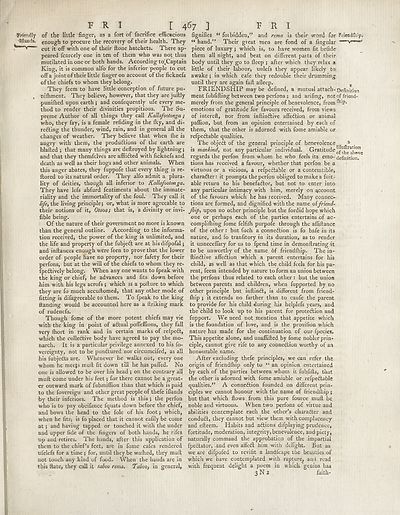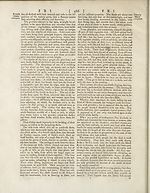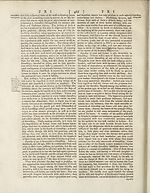Encyclopaedia Britannica > Volume 7, ETM-GOA
(509) Page 467
Download files
Complete book:
Individual page:
Thumbnail gallery: Grid view | List view

F R I [ 467 ] F R I
•Friendly of the little finger, as a fort of facrifice efficacious
Iflands. enough to procure the recovery of their health. They
v" » cut it off with one of their ftone hatchets. There ap¬
peared fcarcely one in ten of them who was not thus
mutilated in one or both hands. According to^Captain
King, it is common alfo for the inferior people to cut
off a joint of their little finger on account of the fickncfs
of the chiefs to whom they belong.
They feem to have little conception of future pu-
, nifhment. They believe, however, that they are juftly
puniihed upon earth ; and confequently ufe every me¬
thod to render their divinities propitious. The Su¬
preme Author of all things they call Kallafootonga;
who, they fay, is a female refiding in the Iky, and di-
redting the thunder, wind, rain, and in general all the
changes of weather. They believe that when (he is
angry with them, the productions of the earth are
blafted ; that many things are deftroyed by lightning;
and that they themfelves are afflicted with ficknefs and
death as well as their hogs and other animals. When
this anger abates, they fuppofe that every thing is re-
ftored to its natural order. They alfo admit a plura¬
lity of deities, though all inferior to Kallafootonga.
They have lefs abfurd fentiments about the immate¬
riality and the immortality of the foul. They call it
life, the living principle; or, what is more agreeable to
their notions of it, Otooa; that is, a divinity or invi-
fible being.
Of the nature of their government no more is known
than the general outline. According to the informa¬
tion received, the power of the king is unlimited, and
the life and property of the fubjeft are at his difpofal;
and inftances enough were feen to prove that the lower
order of people have no property, nor fafety for their
perfons, but at the will of the chiefs to whom they re-
fpeCtively belong. When any one wants to fpeak with
the king or chief, he advances and fits down before
him with his legs acrofs ; which is a pofture to which
they are fo much accuftomed, that any other mode of
fitting is difagreeable to them. To fpeak to the king
ftanding would be accounted here as a ilriking mark
of rudenefs.
Though fome of the more potent chiefs may vie
with the king in point of aCtual poffeffions, they fall
very ftiort in rank and in certain marks of refpedt,
which the collective body have agreed to pay the mo¬
narch. It is a particular privilege annexed to his fo-
vereignty, not to be punCtured nor circumcifed, as all
his fubjeCts are. Whenever he walks out, every one
whom he meefs muft fit down till he has paffed. No
one is allowed to be over his head ; on the contrary all
mult come under his feet; for there cannot be a great¬
er outward mark of fubmiffion than that which is paid
to the fovereign and other great people of thefe illands
by their inferiors. The method is this ; the perfon
who is to pay obeifance fquats down before the chief,
and bows the head to the foie of his foot; which,
when he fits; is fo placed that it cannot eafily be come
at; and having tapped or touched it with the under
and upper fide of the fingers of both hands, he rifes
up and retires. The hands, after this application of
them to the chief’s feet, are in fome cafes rendered
ufelefs for a time ; for, until they be walked, they mull
not touch any kind of food. When the hands are in
this Hate, they call it taboo rema. Taboo, in general.
fignifies “ forbidden,” and rema is their word for Fnendfit'p.
“ hand.” Their great men are fond of a Angular —v-—*
piece of luxury ; which is, to have women fit befide
them all night, and beat on different parts of their
body until they go to lleep ; after which they relax a
little of their labour, unlefs they appear likely to
awake ; in which cafe they redouble their drumming
until they are again fall afleep. t
FRIENDSHIP maybe defined, a mutual attach-Definition
meat fubfilling between two perfons ; and arifing, not of friend-
merely from the general principle of benevolence, from
emotions of gratitude for favours received, from views
of intereft, nor from inftinftive affe&ion or animal
paffion, but from an opinion entertained by each of
them, that the other is adorned with fome amiable or
refpe&able qualities.
The objedt of the general principle of benevolence * .
is mankind, not any particular individual. Gratitude of theabave
regards the perfon from whom he who feels its emo- definition,
tions has received a favour, whether that perfon be a
virtuous or a vicious, a refpedtable or a contemtible,
charadter: it prompts the perfon obliged to make a fuit-
able return to his benefadtor, but not to enter into
any particular intimacy with him, merely on account
of the favours which he has received. Many connec¬
tions are formed, and dignified with the name offriend-
Jhip, upon no other principle but the fordid hope which
one or perhaps each of the parties entertains of ac-
complifhing fome felfifh purpofe through the affiftance
of the other: but fuch a connedtion is fo bafe in its
nature, and fo tranfitory in its duration, as to render
it unneceffary for us to fpend time in demonftrating it
to be unworthy of the name of friendihip. The in-
ftindtive affedtion which a parent entertains for his
child, as well as that which the child feels for his pa¬
rent, feem intended by nature to form an union between
the perfons thus related to each other : but the union
between parents and children, when fupported by no
other principle but inftindt, is different from friend-
fhip ; it extends no farther than to caufe the parent
to provide for his child during his helplefs years, and
the child to look up to his parent for protection and
fupport. We need not mention that appetite which
is the foundation of love, and is the provifion which
nature has made for the continuation of our fpecies.
This appetite alone, and unaffifted by fome nobler prin¬
ciple, cannot give rife to any connedtion worthy of an
honourable name.
After excluding thefe principles, we can refer the
origin of friendfhip only to “an opinion entertained
by each of the parties between whom it fubfifts, that
the other is adorned with fome amiable or refpedtable
qualities.” A connedtion founded on different prin¬
ciples we cannot honour with the name of friendfhip;
but that which flows from this pure fource mufl be
noble and virtuous. When two perfons of virtue and
abilities contemplate each the other’s charadter and
condudt, they cannot but view them with complacency
and efleem. Habits and adtions difplaying prudence,
fortitude, moderation, integrity, benevolence, and piety,
naturally command the approbation of the impartial
fpedtator, and even affedt him with delight. But as
we are difpofed to revifit a landfcape the beauties of
which we have contemplated with rapture^ and read
with frequent delight a poem in which genius has
3 N 2 faith-
•Friendly of the little finger, as a fort of facrifice efficacious
Iflands. enough to procure the recovery of their health. They
v" » cut it off with one of their ftone hatchets. There ap¬
peared fcarcely one in ten of them who was not thus
mutilated in one or both hands. According to^Captain
King, it is common alfo for the inferior people to cut
off a joint of their little finger on account of the fickncfs
of the chiefs to whom they belong.
They feem to have little conception of future pu-
, nifhment. They believe, however, that they are juftly
puniihed upon earth ; and confequently ufe every me¬
thod to render their divinities propitious. The Su¬
preme Author of all things they call Kallafootonga;
who, they fay, is a female refiding in the Iky, and di-
redting the thunder, wind, rain, and in general all the
changes of weather. They believe that when (he is
angry with them, the productions of the earth are
blafted ; that many things are deftroyed by lightning;
and that they themfelves are afflicted with ficknefs and
death as well as their hogs and other animals. When
this anger abates, they fuppofe that every thing is re-
ftored to its natural order. They alfo admit a plura¬
lity of deities, though all inferior to Kallafootonga.
They have lefs abfurd fentiments about the immate¬
riality and the immortality of the foul. They call it
life, the living principle; or, what is more agreeable to
their notions of it, Otooa; that is, a divinity or invi-
fible being.
Of the nature of their government no more is known
than the general outline. According to the informa¬
tion received, the power of the king is unlimited, and
the life and property of the fubjeft are at his difpofal;
and inftances enough were feen to prove that the lower
order of people have no property, nor fafety for their
perfons, but at the will of the chiefs to whom they re-
fpeCtively belong. When any one wants to fpeak with
the king or chief, he advances and fits down before
him with his legs acrofs ; which is a pofture to which
they are fo much accuftomed, that any other mode of
fitting is difagreeable to them. To fpeak to the king
ftanding would be accounted here as a ilriking mark
of rudenefs.
Though fome of the more potent chiefs may vie
with the king in point of aCtual poffeffions, they fall
very ftiort in rank and in certain marks of refpedt,
which the collective body have agreed to pay the mo¬
narch. It is a particular privilege annexed to his fo-
vereignty, not to be punCtured nor circumcifed, as all
his fubjeCts are. Whenever he walks out, every one
whom he meefs muft fit down till he has paffed. No
one is allowed to be over his head ; on the contrary all
mult come under his feet; for there cannot be a great¬
er outward mark of fubmiffion than that which is paid
to the fovereign and other great people of thefe illands
by their inferiors. The method is this ; the perfon
who is to pay obeifance fquats down before the chief,
and bows the head to the foie of his foot; which,
when he fits; is fo placed that it cannot eafily be come
at; and having tapped or touched it with the under
and upper fide of the fingers of both hands, he rifes
up and retires. The hands, after this application of
them to the chief’s feet, are in fome cafes rendered
ufelefs for a time ; for, until they be walked, they mull
not touch any kind of food. When the hands are in
this Hate, they call it taboo rema. Taboo, in general.
fignifies “ forbidden,” and rema is their word for Fnendfit'p.
“ hand.” Their great men are fond of a Angular —v-—*
piece of luxury ; which is, to have women fit befide
them all night, and beat on different parts of their
body until they go to lleep ; after which they relax a
little of their labour, unlefs they appear likely to
awake ; in which cafe they redouble their drumming
until they are again fall afleep. t
FRIENDSHIP maybe defined, a mutual attach-Definition
meat fubfilling between two perfons ; and arifing, not of friend-
merely from the general principle of benevolence, from
emotions of gratitude for favours received, from views
of intereft, nor from inftinftive affe&ion or animal
paffion, but from an opinion entertained by each of
them, that the other is adorned with fome amiable or
refpe&able qualities.
The objedt of the general principle of benevolence * .
is mankind, not any particular individual. Gratitude of theabave
regards the perfon from whom he who feels its emo- definition,
tions has received a favour, whether that perfon be a
virtuous or a vicious, a refpedtable or a contemtible,
charadter: it prompts the perfon obliged to make a fuit-
able return to his benefadtor, but not to enter into
any particular intimacy with him, merely on account
of the favours which he has received. Many connec¬
tions are formed, and dignified with the name offriend-
Jhip, upon no other principle but the fordid hope which
one or perhaps each of the parties entertains of ac-
complifhing fome felfifh purpofe through the affiftance
of the other: but fuch a connedtion is fo bafe in its
nature, and fo tranfitory in its duration, as to render
it unneceffary for us to fpend time in demonftrating it
to be unworthy of the name of friendihip. The in-
ftindtive affedtion which a parent entertains for his
child, as well as that which the child feels for his pa¬
rent, feem intended by nature to form an union between
the perfons thus related to each other : but the union
between parents and children, when fupported by no
other principle but inftindt, is different from friend-
fhip ; it extends no farther than to caufe the parent
to provide for his child during his helplefs years, and
the child to look up to his parent for protection and
fupport. We need not mention that appetite which
is the foundation of love, and is the provifion which
nature has made for the continuation of our fpecies.
This appetite alone, and unaffifted by fome nobler prin¬
ciple, cannot give rife to any connedtion worthy of an
honourable name.
After excluding thefe principles, we can refer the
origin of friendfhip only to “an opinion entertained
by each of the parties between whom it fubfifts, that
the other is adorned with fome amiable or refpedtable
qualities.” A connedtion founded on different prin¬
ciples we cannot honour with the name of friendfhip;
but that which flows from this pure fource mufl be
noble and virtuous. When two perfons of virtue and
abilities contemplate each the other’s charadter and
condudt, they cannot but view them with complacency
and efleem. Habits and adtions difplaying prudence,
fortitude, moderation, integrity, benevolence, and piety,
naturally command the approbation of the impartial
fpedtator, and even affedt him with delight. But as
we are difpofed to revifit a landfcape the beauties of
which we have contemplated with rapture^ and read
with frequent delight a poem in which genius has
3 N 2 faith-
Set display mode to:
![]() Universal Viewer |
Universal Viewer | ![]() Mirador |
Large image | Transcription
Mirador |
Large image | Transcription
Images and transcriptions on this page, including medium image downloads, may be used under the Creative Commons Attribution 4.0 International Licence unless otherwise stated. ![]()
| Encyclopaedia Britannica > Encyclopaedia Britannica > Volume 7, ETM-GOA > (509) Page 467 |
|---|
| Permanent URL | https://digital.nls.uk/189127846 |
|---|
| Attribution and copyright: |
|
|---|
| Description | Ten editions of 'Encyclopaedia Britannica', issued from 1768-1903, in 231 volumes. Originally issued in 100 weekly parts (3 volumes) between 1768 and 1771 by publishers: Colin Macfarquhar and Andrew Bell (Edinburgh); editor: William Smellie: engraver: Andrew Bell. Expanded editions in the 19th century featured more volumes and contributions from leading experts in their fields. Managed and published in Edinburgh up to the 9th edition (25 volumes, from 1875-1889); the 10th edition (1902-1903) re-issued the 9th edition, with 11 supplementary volumes. |
|---|---|
| Additional NLS resources: |
|

